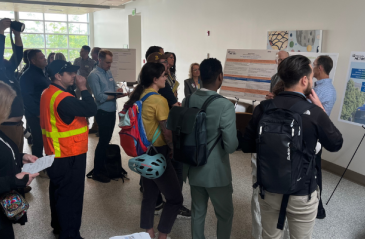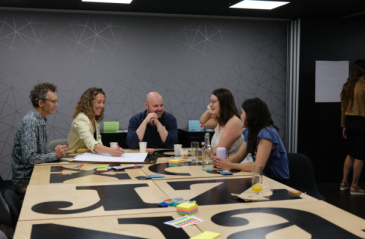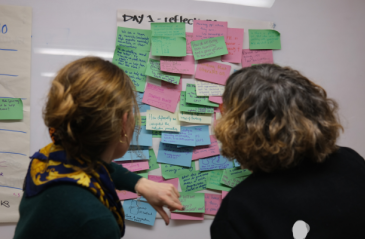
The information barriers holding back climate action and how to break them

Nick Martin: I teamed up with a group of fellow nerds who were excited about technology
Share articleTechChange operatse in countries such as Uganda, Sudan and Pakistan
Share articleNick Martin: The idea is to be able to access any educational content anywhere at any time
Share articleWe put our vision for government into practice through learning partner projects that align with our values and help reimagine government so that it works for everyone.
To progress, to develop, to learn. These are basic tenets of humanity. It doesn't matter how old you are. From London to Lima, San Francisco to Sydney, human beings share a basic desire to keep moving forward, to broaden our understanding of the world around us. Unfortunately, our ability to access such learning is not always straightforward. Where people live in the world, and whether their pockets are sufficiently deep, have long hindered the principle of lifelong learning. Until now.
Today, a student - young or old - does not need to be in a classroom or lecture hall with their teacher. A click of a mouse or swipe of a tablet can unlock a world of open access education, one where geography need not limit someone's ambitions. TechChange, a social enterprise based in Washington, DC, is leading the charge. A provider of online professional development in technology and social change, TechChange is helping development professionals move their communities forward by providing online courses on issues such as public health and emergency response.
For its founder and CEO Nick Martin, it's about helping people who want to make a positive difference in the world. “We are a social enterprise,” he explains. “We design and deliver courses for people who want to use technology to create real change in their communities, like how to use a 3D printer for social good or how to use a mobile device for public health delivery.”
Martin's success with TechChange occurred after he completed not one, but two degrees. It was a time of academic accomplishment but one that perhaps did not unlock many career options - as he self-deprecatingly admits. “I graduated with a modern poetry degree - my parents were a little worried at that point,” he recalls. “And they were even more worried when, thinking that my first degree was too practical, I then took a master's in peace education. I had trouble getting a job but eventually teamed up with a group of fellow nerds who were not only excited about technology but also the role it could play in creating a positive social impact.”
It's no wonder they were excited. A digital ecosystem supporting billions of connected devices was emerging, reshaping how we live, work, play and learn. But that wasn't the case for everyone. The digital revolution did not automatically lift hundreds of millions of people out of extreme poverty. For them, the pain and suffering that goes hand-in-hand with surviving on under $1.25 a day continues to endure. It is clear that for many, the digital revolution - let alone a good education - remains out of reach.
“We were looking at all these examples of how technology was driving innovation but also felt that a lot of the world missed out,” recalls Martin. “In the field of international development, it's very expensive to put a trainer on a plane to put on workshops in emerging countries. So we took hundreds of online courses, and tried to work out how to extend the scope of this content. From there we built a model for online learning that we found to be unique. It is really predicated on social learning so instead of one omniscient lecturer teaching a specific course, we aim to have facilitators whose role it is to connect learners to each other and really create more of a community in the process.”
The success of this approach has seen TechChange operate in countries such as Uganda, Sudan and Pakistan, overcoming barriers like language, security and variable internet bandwidth. A major component of their work is with government agencies such as USAID. “We have trained its staff across the agency in how to better collect data over mobile devices,” explains Martin.
When asked about how this agenda will continue to evolve, Martin identifies two major factors. The first, he says, is the increasing desire of online students to feel a sense of connection. “People want to feel connected to other learners via an open platform, but they also want courses like they want Netflix movies and so we're trying to figure out a nice balance,” he says. “The idea is to be able to access any educational content anywhere in the world at any time. But there is also a movement that is about feeling connected, because they learn more and are incentivised when part of a community. We're trying to find a happy medium where our courses blend some of both.”
The second key factor is the escalating cost of graduate school, especially in the United States. For example, the Harvard Kennedy School of Government's two-year public policy degree costs $150,000 - which most people would have to take out loans to afford. “Even an online masters degree at an American university is $70,000 for two years,” adds Martin. “A lot of the cost is driven by a facilities race - the perceived need to build the biggest library or sports centre. We think there is a need to provide an alternative to graduate school at a fraction of the cost - particularly for people who want to have a career in social innovation or international development where the average not-for-profit salary is about $40,000. You can do the math.”
With this in mind, Martin and his team at TechChange believe there is a genuine opportunity to extend the scope of their services in the years ahead. “We want to be the go-to destination for all online learning and training in the public health and international development sectors,” he says. “We want to offer the best interactive training possible and provide alternatives for people at a lower cost - we're only getting started.”











